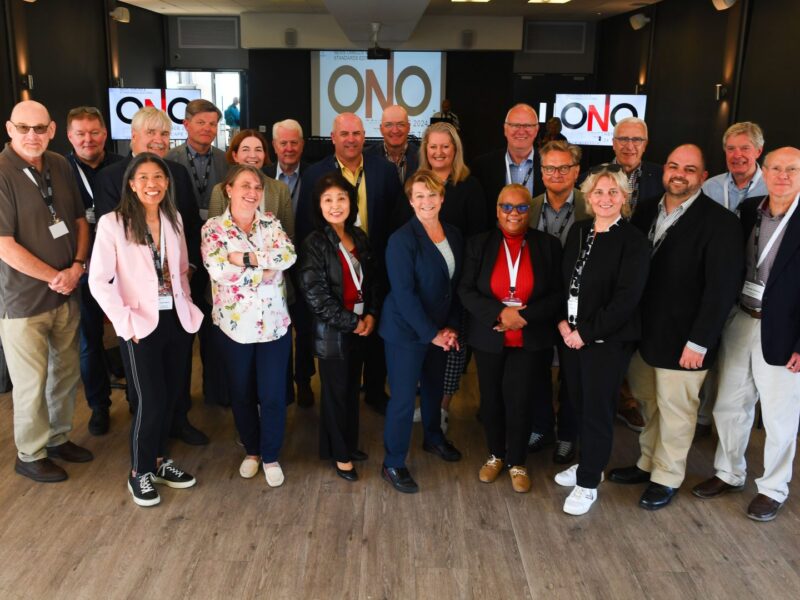
Our Mission
ONO is an international association representing ombuds, readers’ editors, and standards editors across print, broadcast, and digital newsrooms worldwide.
Dedicated to protecting and enhancing quality journalism by encouraging respectful and truthful discourse about journalism’s practices and purposes.
A Word From The Board Link to December newsletter Dear colleagues, This last newsletter before Christmas first brings good cheer – El País has confirmed its generous.
A Word From The Board Dear colleagues, It’s a little hard to see beyond the US election as its outcome is of such grave importance within and.
A word from the board Dear colleagues, The role of ONO members is usually concerned with the decisions that news organisations make about the way they report.
Engage in discussions, workshops, and panels that shape the future of news integrity and transparency.
Membership
Connect with peers dedicated to ethical journalism and enhance your role as a news ombud or standards editor.
Engage in discussions, workshops, and panels that shape the future of news integrity and transparency.
Shop Talks
Participate in informal sessions to share experiences, tackle challenges, and explore solutions in real time.

“As a proud member of the Organization of News Ombuds and Standards Editors, I have seen firsthand the transformative impact that strong ethical oversight and steadfast standards have on building public trust. Being part of this dedicated group has deepened my commitment to upholding accuracy, transparency, and accountability in every aspect of news reporting.”
Standards Editor | News Organizations
The ONO HANDBOOK
By Jeffrey Dvorkin
This 51-page handbook authored by former executive director Jeffrey Dvorkin, offering practical insights and strategies for ombuds and standards editors committed to media transparency and ethics.
Covering key responsibilities, audience engagement, and trust-building in the digital age, it’s an essential tool for professionals dedicated to enhancing journalistic integrity.
$Free
Answers You Can Trust
Explore our FAQs to learn more about the role of ombuds and standards editors, upcoming events, and membership in ONO.
The ONO is a global association of news ombuds, standards editors, and media accountability professionals who work to uphold journalistic ethics, transparency, and integrity.
We provide resources, guidance, and a platform for those dedicated to promoting responsible journalism.
An ombuds is someone who handles complaints and attempts to find mutually satisfactory solutions.
Ombuds can be found in media, government, corporations, hospitals, universities and other institutions.
The first ombuds was appointed in 1809 in Sweden to handle citizens’ complaints about the government. The word is pronounced “om-BUDS”.
A news ombuds receives and investigates complaints from newspaper readers or listeners or viewers of radio and television stations about accuracy, fairness, balance and good taste in news coverage.
He or she recommends appropriate remedies or responses to correct or clarify news reports.
No two ombuds work exactly alike, but they typically monitor news stories, columns, photography, and other graphic materials to ensure fairness, accuracy, and balance. They bring any substandard items to the attention of the appropriate members of the news staff.
Ombuds investigate and respond to comments and complaints about published or broadcast news and feature content, obtaining explanations from editors and other staff members for readers, viewers, or listeners.
Some ombuds oversee corrections, while others write internal newsletters on reader feedback and concerns. Many ombuds publish regular columns addressing issues of public interest or specific grievances, which may critique, explain, or commend media content as appropriate.
Ombuds also often facilitate public forums or advisory boards to connect more closely with readers and frequently speak to public and private groups to explain media practices. Some send accuracy questionnaires to individuals mentioned in news stories to solicit feedback.
In smaller news organizations, ombuds may take on additional news-related duties. However, in all cases, news ombuds serve in an advisory role, not as disciplinarians.
An ombuds helps demystify the news-gathering process for the public, addressing what can often seem mysterious and, as a result, raises suspicion among readers.
Having a designated contact person can bridge the gap, countering the perception that news media are aloof, arrogant, or unresponsive to public concerns and generally inaccessible to everyday citizens.
An ombuds’ column offers readers an additional, valuable forum for engagement, especially in cities with only one newspaper.
Most ombuds are selected from within the senior staff of the newspaper or broadcaster they monitor.
A few are on fixed-term contracts. In any case, they typically have deep experience in journalism and are chosen also because they have the ability to relate easily and openly to readers.
Relatively speaking, yes — at least in the United States and Canada.
The first newspaper ombuds in the U.S. was appointed in June 1967 in Louisville, Kentucky, to serve readers of The Courier-Journal and The Louisville Times.
The first Canadian appointment — at The Toronto Star — was in 1972.
The concept was in place much earlier in Japan. The Asahi Shimbun in Tokyo established a committee in 1922 to receive and investigate reader complaints.
Another mass circulation Tokyo paper, The Yomiuri Shimbun, set up a staff committee in 1938 to monitor the paper’s quality. In 1951 this group became an ombudsman committee which today hears reader complaints about the paper and which meets daily with editors.
News ombuds today are found throughout North and South America, Europe, and parts of the Middle East and Asia.
No. Some news organizations use titles such as “readers’ representative,” “readers’ advocate,” or “public editor.”
Others have an assistant managing editor or an assistant to a senior editor act as an ombuds.
The organization welcomes all news ombuds and standards editors.
Others from the media, press councils, journalism schools or journalism publications may apply for associate membership.
Click Here to apply for membership.
For questions about membership, please contact ONO’s Executive Director.
Annual dues are:
Organization of News Ombuds and Standards Editors
Tax ID Number: 68-0372536
ONO is a qualified 501(c)(3) tax-exempt organization and donations are tax-deductible to the full extent of the law.
© 2024 Organization of News Ombuds and Standards Editors
Designed and Hosted by Honeytree